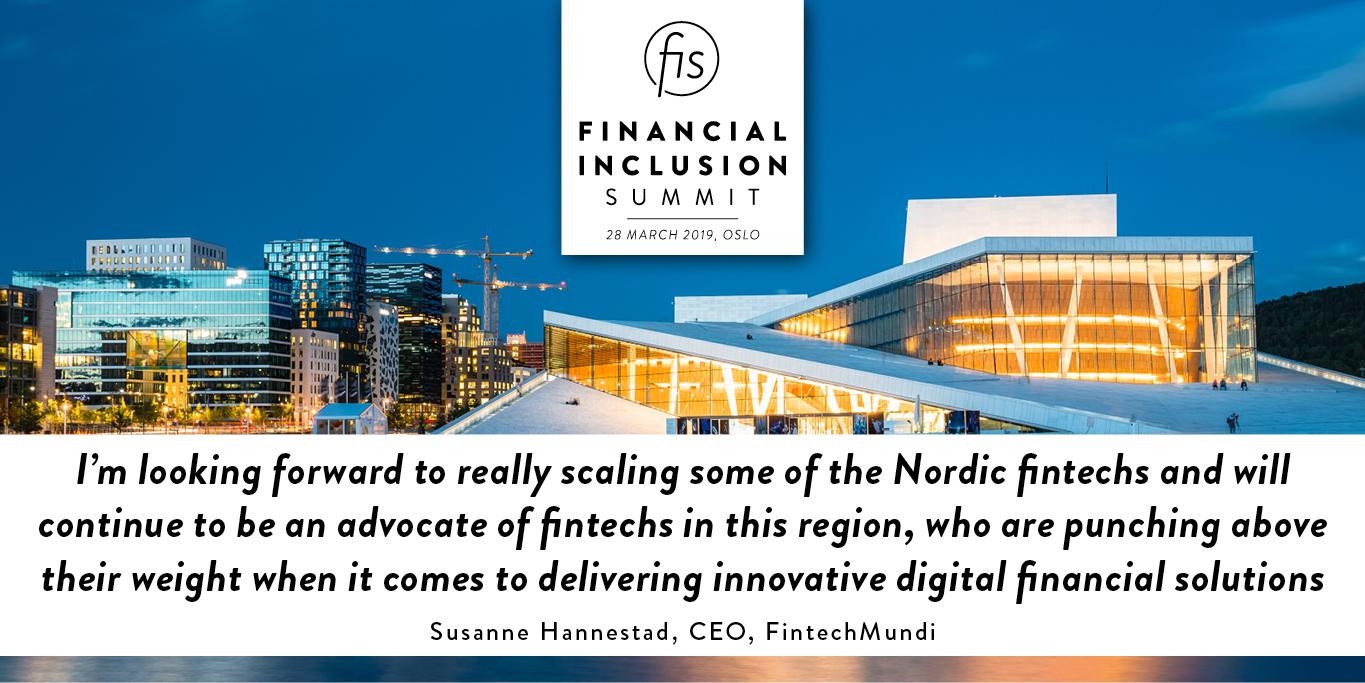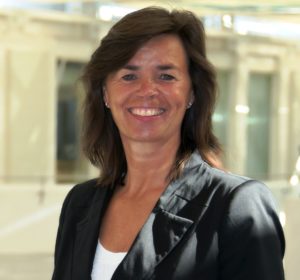
Interview with Susanne Hannestad, Chief Executive Officer, Fintech Mundi, Global Fintech Accelerator

by Simon Cocking, Irish Tech News
1 min pitch for what you are doing now?
Fintech Mundi has teamed up with the Lighthouse Development Programme, a joint venture between Mastercard and NFT Ventures to find and help develop the next-generation of fintechs in the Nordic and Baltic region. We are brought in as an advisor to the fintechs to help them with strategy, scaling and growth. The Spring series which kicked off earlier this month (March) includes fintechs from Copenhagen, Tallinn and Oslo. Finalists will be selected in June and the winner of a free ticket for the Mastercard Startup Lab will be announced at Money2020 Europe. My role is to advise fintechs on how to scale their business for expansion.
I am also in the process of organising the Financial Inclusion Summit which takes place in Oslo on 28 March in partnership with Mastercard to showcase Nordic Fintech companies providing concrete solutions for emerging market in Asia, Africa and Latin America. In addition, I’m working with MagnaCarta Communications on producing the Nordic Fintech Disruptors Report, a comprehensive annual research series covering developments in the digital financial services space.
How was the last year, what worked well, what didn’t move as quickly as you would have liked?
I am working very closely as an adviser to Nordic scale-ups Payr, Cloud Insurance, Blockbonds and Neonomics, all of which are achieving excellent results. The fourth annual edition of the Nordic Fintech Disruptors Report launched very successfully at Money2020 last year and it continues to be an invaluable source of information for our work with fintechs across Europe. I’m also very proud of my association with the Lighthouse Development Programme and the enormous contribution it is making in stimulating growth and innovation in digital financial services in our region.
What’s gone less well in the past year is the promise of PSD2. We are finding that the banks are still moving very slowly and, while they say their APIs are ready for the fintechs, the reality is that these present not much more than a sandbox as opposed to an open environment for live transactions.
What are your plans for the future?
I’m looking forward to really scaling some of the Nordic fintechs and will continue to be an advocate of fintechs in this region, who are punching above their weight when it comes to delivering innovative digital financial solutions. The insight from Financial Inclusion Summit will be brought forward to collaborate with all stakeholders to reduce financial inclusion in the emerging market and plan for next summit in 2021. I continue to serve as Chairman and Board Director of numerous fintechs and new banks.
What will you be talking about at this event?
I am moderating the “Shifting Currents: Innovators Speak Out” session where the founders of Blockbonds, Bright Products, Moni and Diwala will join African and Latin American fintech hubs to discuss how governments and the financial sector should harness the ingenuity of entrepreneurs, and local and international innovation communities to meet inclusive growth goals. We have over 30 Nordic fintechs that have developed concrete solutions for emerging markets at the Summit.
What inspired you to organise this?
It started with a question posed in a global report about how organisations and governments can make sure that humanitarian aid payments end up in the right place and how the use of digital money could potentially address some of the challenges faced by donors. Jan Egeland, Secretary General of the Norwegian Refugee Council and Tara Nathan, Group Executive for Public Private Partnerships at MasterCard were part of the report working group who actively addresses these issues. My view is that this is something the Nordic region can help with. The Nordic region’s success in humanitarian efforts, building a cashless society, and global reputation for transparency, openness and design-led thinking, puts it in a strong position to help solve one of society’s most intractable challenges.
By convening an international gathering – Financial Inclusion Summit – of stakeholders from Government and the public sector, together with private sector leaders from business and technology, the Nordics can contribute to reducing poverty and driving growth by creating a dialogue for a long-term solution to financial inclusion, aided by latest advances in financial technology. So the Financial Inclusion Summit is in a sense an initiative aimed at building a bridge between governments and organisations that are providing a lot of funding and entrepreneurial companies that have concrete solutions to aid financial inclusion.
Which influencers and websites do you follow to keep up to date with the latest developments?
Finextra, Financial Times on a daily basis, the Nordic Web and the Economist on a weekly basis and of course I follow various social media feeds and discussion with various fintech companies.
How can people find out more about what you are working on?
I do a lot of speaking engagements predominantly in Europe. More details can be found on the Fintech Mundi website www.fintechmundi.com and the website for the Inclusion Summit www.financial-inclusion.com.www.financial-inclusion.com
The Fintech Disruptors Report series produced in partnership with MagnaCarta is a good source of thought leadership and industry intelligence and can be accessed here.
The Financial Inclusion Summit takes place in Oslo, Norway, on 28 March 2019. To find out more or request an invitation, visit: https://financial-inclusion.com/#register
Follow us on @FinIncSummit #fintechforall
